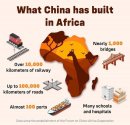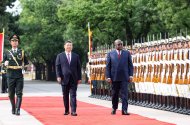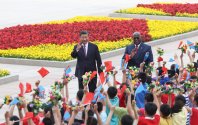China holds upper hand in battle with U.S. for Africa's energy
Growing competition could 'reshape global power dynamics,' analyst says
The Grand Ethiopian Renaissance Dam is a massive hydropower plant on the River Nile that neighbors Sudan and Egypt. © Getty Images
ROBERT BOCIAGA, Contributing writerApril 19, 2023 10:53 JST
JUBA, South Sudan -- Power generation has become the latest battleground in the China-U.S. competition in Africa, giving resource-poor countries a chance to seek more project funding.
Beijing's investments in energy infrastructure have expanded greatly, while the U.S. has launched a counter-offensive to increase its own influence on the continent.
The superpower battle is clear in areas such as a proposed expansion of hydropower in South Sudan. The World Bank has expressed interest in financing the project, which would provide electricity to the country and generate revenue from energy exports to neighboring countries. However, China is also interested in the venture and has offered to finance it through its Belt and Road Initiative that it uses to build infrastructure globally.
South Sudan -- where only about 1% of its 12.5 million people have access to electricity, according to its state-run utility company -- holds the potential to generate over 2,500 megawatts of electricity from hydropower.
"If China is successful in securing the project in South Sudan, it would strengthen its influence in the region and add another energy project to its Belt and Road Initiative," said Ibrahim Magara, a policy leader fellow at the Florence, Italy-based School of Transnational Governance. "On the other hand, if the U.S. is successful, it would mark a significant win in its efforts to counter China's growing influence in Africa."
Ryan O'Grady, CEO of Kush Bank, a leading South Sudanese bank in the energy sector, said that no matter whether the U.S. or China gets the upper hand, "the country will continue to benefit from strong relationships, east and west, in a balanced fashion."
Chinese investments in sub-Saharan Africa energy infrastructure grew tenfold over the 10 years through 2020 to $14.5 billion, according to a recent report by the Atlantic Council, a U.S.-based think tank. This has given Beijing a significant presence in the region, with Chinese companies involved in the construction of major power projects, such as the Mambila Hydropower Project in Nigeria and the Grand Ethiopian Renaissance Dam in Ethiopia.
China's increasing influence in Africa could pose a threat to U.S. interests, particularly as Beijing seeks to expand its military presence on the continent, the Atlantic Council report said.
Chinese companies have already secured deals to supply energy to more than 15 African countries, with a total capacity of over 10,000 MW. By contrast, the U.S. has only secured deals to supply energy to three African countries, with a total capacity of just over 1,000 MW.
Also, the World Bank -- which is traditionally led by an American -- is no longer the sole provider of financing and technical assistance for development projects in sub-Saharan Africa. From 2018 to 2020, the bank is estimated to have disbursed approximately $34 billion to the region, less than China's investment and construction, which is estimated by the Atlantic Council at around $54 billion for in that period.
The U.S. has responded by seeking to increase its access to African oil and gas reserves.
In 2020, Washington launched the Prosper Africa initiative, aimed at boosting trade and investment on the continent. The plan includes a focus on energy, with the U.S. providing technical assistance and funding for energy projects in the region.
Then in 2022, Washington launched the U.S.-Africa Energy Forum. This brought together government officials and energy executives to discuss ways to expand energy access.
Yet, some doubt that the proposed U.S. investments will actually happen. "The U.S. has talked about electricity in Africa for a long time, [but] I suspect the U.S. is going to "compete" in energy in Africa by pointing out shortcomings in Chinese projects," said Kai Xue, a Beijing-based Africa investment expert.
Meanwhile, China's increasing dominance in African energy raises tough questions of its own for countries where it invests. These include concerns about debt sustainability, environmental impact, and the potential for Beijing to use its energy investments as leverage for political gain.
At the same time, both China and the U.S. have become embroiled in security problems and political tensions in African countries.
In Ethiopia, the Chinese-funded construction of the Grand Ethiopian Renaissance Dam has created a diplomatic standoff with Egypt over sharing water resources from the Nile River. The U.S. has tried to mediate between the countries but this led Ethiopia to downgrade relations with its former military ally.
Thousands of kilometers south in Mozambique, the continuing Islamist insurgency has repeatedly delayed the launch of a multibillion dollar investment in liquefied petroleum gas by French company TotalEnergies.




